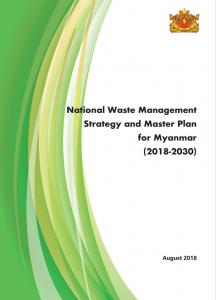Myanmar has had to face tremendous challenges in waste management in the recent past, due to a number of factors – its growing population and economy, increasing complexity of waste streams, and lack of effective waste management systems, proper infrastructure, capital investment, financial and human resources, as well as effective policy and regulatory environment. As a cross-cutting issue, waste management touches on all aspects of sustainable development, including the environment, society and economy, and as such is widely associated with a range of global challenges, including public health, climate change, poverty, food security, resource efficacy, sustainable cities and production and consumption.
To address these issues, the National Waste Management Strategy and Master Plan (2018-2030) was developed by the Ministry of Natural Resources and Environmental Conservation (MONREC) with the assistance of the International Environmental Technology Centre (IETC) of the United Nations Environment Programme (UN Environment) and the IGES Centre Collaborating with UNEP on Environmental Technologies (CCET). It aims to build capacity for sustainable waste management and promote development of a conducive policy framework and strategies that transit from a conventional waste management paradigm to sustainable waste management based on waste hierarchy and the 3Rs (reduce, reuse and recycle), in linkage with other national environmental policies.
The National Waste Management Strategy and Master Plan is the first national initiative aimed at institutionalising waste management and offers a vision and strategy to address key issues, needs and challenges, whilst also raising awareness amongst key stakeholders towards achieving a resource-efficient and zero-waste society. Its holistic nature means it addresses waste in all its forms (solid waste, liquid waste/ wastewater, and gaseous emissions) for pollution control and environmental management, although at present prioritises solid waste management.
The National Waste Management Strategy and Master Plan is also intended to identify strategic policy directions, programmes and actions for sustainable development in waste management, ensuring that wastes generated are managed in a more environmentally-friendly manner to both limit short-term environmental impacts caused by the waste management system, as well as, over the medium and long term, be socially acceptable and economically feasible. The waste management hierarchy and 3Rs together provide a conceptual framework that will lead to the most desirable waste management options in order to improve solid waste collection, intermediate treatment and disposal. It is structured around a framework of six goals and identified priority actions to maximise proper collection and disposal of all solid waste including municipal, industrial, medical, plastic, hazardous and emerging waste, proper disposal and treatment of liquid waste (wastewater from domestic sector and industry), whilst ensuring waste management services are sustainable over the long term. The latter would be achieved through establishing an enabling framework including supportive financial mechanisms, sound policies, and institutional and monitoring frameworks.
(This strategy was submitted in August 2018 and officially adopted and published in January 2020.)

